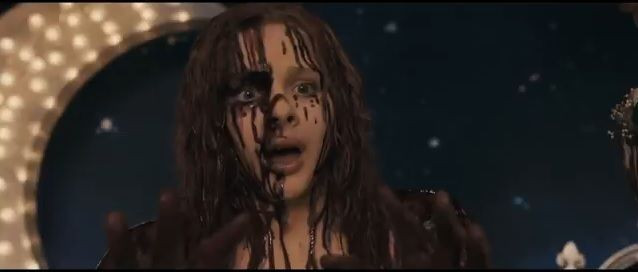
We all remember Brian De Palma's 1976 classic "Carrie." It was the first Stephen King novel to be adapted for film and it featured a very young Sissy Spacek. The plot revolved around Carrie White, a socially outcast teenage girl who suffers frequent abuse from her religious mother Margaret and her classmates. Carrie discovers that she possesses telekinetic powers that she manifests when she gets angry or distressed. She is led to believe that one of the popular boys in school liked her and he even invites her to prom, only to play a joke on her. She later uses her powers to seek revenge against the student body at her school.
Now Carrie is back in a screen remake directed by Kimberly Peirce, mostly known for "Boys Don't Cry," and starring Chloë Grace Moretz and Julianne Moore. This movie remained very faithful to De Palma's original version, but was updated to relate to the current times. People have started to see it with different eyes; what was a movie about a teenager going through the typical struggles of adolescence has become extra real after recent tragedies of school shootings and kids who are bullied to death. As Michael O'Sullivan from The Washington Post wrote, "Peirce takes full advantage of this zeitgeist, updating the story for the Facebook and YouTube age."
"Early in the film, in the famous shower scene when Carrie gets her period without knowing what it is, a classmate immediately whips out her cellphone, and then posts the video of a bloody, bawling Carrie online. The casual cruelty feels frighteningly real," he added. To make the script more relatable, Peirce had the assistance of Lawrence D. Cohen, who wrote the original "Carrie" adaptation, and Roberto Aguirre-Sacasa, hired to fix the Broadway musical "Spider-Man: Turn Off the Dark" after Julie Taymor was fired. However, not everyone felt the same, and part of reviewers' ambivalence comes from Peirce sticking too closely to De Palma's template minus his operatic camp and the excess of digital effects.
Newsday's Rafer Guzman wrote, "With nothing new to offer, 'Carrie' is reduced to attempting the impossible: repeating De Palma's long, tense buildup to Carrie's prom, one of the most stylishly executed horror-film sequences in history. Peirce doesn't dare rip off De Palma's famous split screen -- no director would -- so the disappointment is inevitable. Peirce has already made a better version of this story anyway, her phenomenal 1999 film 'Boys Don't Cry,' about a small-town transgender girl who learns just how far a herd mentality can go. It's far more effective, and far more horrifying, than 'Carrie.'"
The Los Angeles Times' Betsy Sharkey praised the performances, but was underwhelmed: "Peirce pulls out a sensitivity and depth in [Moretz] that brings her performance to a new level. And Moore has never had a better handle on demented. But except for a ridiculously sanitized new ending, new 'Carrie' is not that different from old 'Carrie.' And that's a crying shame." Nevertheless, Variety's Justin Chang was a bit more forgiving: "'Carrie' sustains interest as a moody psychological/paranormal drama with a melancholy undertow that at times tilts into genuine pathos. If the film never quite shakes off the feeling of having been constructed from a well-worn blueprint, it has a sensitive interpreter in Peirce, who...here offers a fresh, intelligent spin on certain key aspects of a largely familiar tale."
What do you think? Would you watch it after reading these reviews? Check out the trailer below and let us know!
© 2025 Latin Times. All rights reserved. Do not reproduce without permission.





